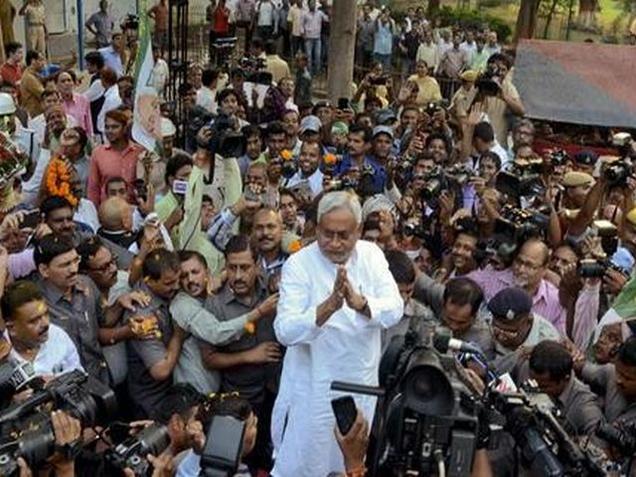Political vacuum in the Bihar win

Bihar Victory for Whom?
By Yogendra Yadav, in The Hindu, November 23, 2015
The euphoric moment of an electoral battle is dangerous for it could take eyes off the retreat on multiple fronts in the ongoing political war for the very idea of India.
(Note: Yogendra Yadav, the author of this article and Prasnth Bhushan were the brain power behind the rise of Aam Admi Party. When they were ditched brutally in bright day light (and many said then: “You too Brutus, Tu quoque Brite” to Kejri) AAP lost its national appeal. Can Yadav and his ilk make a come back with a cleaner party in Indian politics? This is what many intellectuals are despairingly wondering. They also fear if the Lalu-Kejri bear hug would play spoil sport in Bihar politics. The lesson from Bihar to all political parties is: “United we stand, divided we fall” and if vacillating public opinion based on shallow minds of 31% of young voters could bring up a Modi magic, it can also topple him from his high throne now swinging like a reed in the wind blowing in opposite direction. But if the victorious alliances are to rule 5 years, they should start serving instead of looting the public. james kottoor, editor)
A serious setback for the BJP in Bihar need not be a substantial gain for progressive forces. The euphoric moment of an electoral battle is dangerous for it could take eyes off the retreat on multiple fronts in the ongoing political war for the very idea of India.
There was something deeply paradoxical about the ceremony at Gandhi Maidan, Patna last week. Meant to mark Nitish Kumar’s spectacular return to power, it ended up highlighting Lalu Prasad again taking centre stage, quite literally so. Designed to showcase a new national alternative to the Bharatiya Janata Party (BJP), it brought together actors whose political bankruptcy was responsible for the rise of Narendra Modi in the first place. Looked forward to as a moment of triumph of democracy, it would be remembered for the rise of another dynasty. Instead of filling a gap, the crowded stage at Gandhi Maidan underlined a political vacuum in national politics.
Yogendra Yadav
If this growing political vacuum is not self-evident, it is because the sheer relief of the electoral message from Bihar has created a false sense of collective victory and numbed our political judgment. Those who uphold the constitutional vision of a just, plural and liberal India feel so cornered that they are willing to celebrate a return to where we were some time ago and present it as a giant leap forward. The unbridled joy at who has lost has made them forget what has won.
A need for caution
No doubt the relief in the Bihar’s electoral verdict is substantial and real. If the Assembly elections in Delhi had shown that the Modi juggernaut could be halted, Bihar has confirmed that the myth of Modi’s invincibility was just that, a myth. It has reminded us that Assembly elections are no longer a replay of the Lok Sabha elections; that the BJP cannot take victory for granted, especially if it is not facing an emasculated Congress. It has put a question mark over the dominance of the National Democratic Alliance (NDA) in national politics, the BJP’s monopoly within the NDA and the Modi-Shah duo’s control over the BJP. Mr. Modi’s swagger is gone. And that’s not a trivial relief. More importantly, Bihar has dented the ruling dispensation’s belief that it could get away with anything. For those at the receiving end of the majoritarian onslaught over the last one year, this must be nothing short of a vindication of democratic politics.
It is precisely at this slope that we need a foot on the brakes. We need to exercise caution and exhibit political judgment. We need to remember that a serious setback for the BJP need not be a substantial gain for progressive forces. The warding off of an imminent threat to minorities is not necessarily a victory for secular politics. The victory of an alliance of “backwards” is not quite an advancement of social justice. The return of a chief minister who governed better is not an assurance of good governance in the future. This euphoric moment of an electoral battle is dangerous for we could take our eyes off the retreat on multiple fronts in the ongoing political war for the very idea of India.
Arithmetic compulsions and beyond
Let us begin with simple electoral arithmetic. Put crudely, the grand success of the Grand Alliance boils down to this: number one (Janata Dal–United) and number two (Rashtriya Janata Dal) in Bihar politics till recently had to come together to defeat number three (BJP), and that too with some assistance from number four (Indian National Congress). Thus, the very formation of the Grand Alliance was an acknowledgment of the pre-eminence of the BJP. While BJP spokespersons were clutching at straws in highlighting the party’s vote share, it would be naïve to overlook that the party has its highest ever vote share in the Bihar Assembly elections. This crushing electoral defeat leaves the BJP in no position right now to build on this base and emerge as the pre-eminent force in State politics, but it is too early to say how this might pan out in Bihar in 2020.
The long-term, national trend of the BJP’s expansion to all corners of the country has not been reversed. Singed by Bihar, the BJP is unlikely to stake much in the Assembly elections due next year, but it is likely to continue its gradual expansion in Kerala, Bengal, and in particular Assam. Notwithstanding 2015, the BJP is still on its way to becoming as nation-wide a political force as the Congress used to be. More than electoral arithmetic, the Bihar elections have signalled a retreat of politics and political imagination in at least three dimensions.
Crisis of secular politics
The Bihar elections continued, if not accentuated, the crisis of secular politics. Mr. Modi’s meteoric rise to power was made possible by a discrediting of a “pseudo-secular” vote bank politics of “minority appeasement”. The middle ground of national mood had shifted towards majoritarianism. After the BJP’s coming to power, “Hindutva” hardliners overplayed their hand and were rebuffed by the public. The brazen attempt to use the cow card to trump everything else did not succeed in Bihar. But it does not mean that communal polarisation did not take place both among Hindus and Muslims of Bihar. By all accounts, majority communalism was more intense this time than in the last few decades. Muslims had no option except to vote for anyone who could defeat the BJP. The reason Muslims voted for the Grand Alliance in Bihar was not very different from why they vote for the All India Majlis-E-Ittehadul Muslimeen in Hyderabad or for the All India United Democratic Front in Assam. The result was a relief for minorities, but not a victory for secularism.
Similarly, the Bihar verdict averted the possibility of a return to an upper caste stranglehold over political power. But it did so by a familiar game of caste-based mobilisation: it was the BJP’s upper caste plus Most Backward Castes (MBC) plus Dalits versus the Grand Alliance’s coalition of the dominant Other Backward Classes (OBC) with Muslims. The latter won, but it is hard to project it as a forward march of social justice. At best, it is a return to the equilibrium of the 1990s when the upper caste monopoly was first challenged. In one respect it is a step back. Unlike the 1990s, the lower social order is fractured as Dalits and the MBCs are no longer firmly with the dominant OBCs.
A retreat on development
Finally, the elections represent a retreat on the front of governance or development as well. Bihar lost this election as soon as Mr. Kumar concluded that he could not contest on his own, on his government’s record of development. No doubt, his relatively better record was an additional factor that helped the Grand Alliance counter the BJP’s posturing on development, but the new government is unlikely to take big strides on the governance front. And this is not just because Mr. Kumar is now tied to Mr. Prasad, famous for his indifference to governance. It is also because Mr. Kumar could not come up with a new model of development after exhausting the low-hanging fruits in the early part of his regime. Nor has he gone beyond a bureaucratic-driven approach to development. This relates to a political deficit at the national level. Beyond occasional potshots at “suit-boot ki sarkar” and rare agitations like resistance to the Land Acquisition Ordinance, the opposition to Mr. Modi has little to offer by way of an alternative to his model of development.
This multi-pronged retreat has deepened the existing political vacuum, both in the government and in the Opposition. If the government seeks to bypass all democratic institutions, the Opposition has relied on the shortcut of parliamentary blockade. It is left to writers and intellectuals to take on the most organised attack on the idea of a diverse India. Popular indifference to some of the majoritarian lunacies is assumed to be a substitute for a political shaping of public opinion.
In this vacuum, the Opposition takes the form of old, tried and tired alliances. Much abused anti-Congressism is replaced by vacuous anti-BJPism. In this sense, the stage at Gandhi Maidan, Patna, did not herald a new alternative. Rather, it was an admission of a lack of alternatives. Worse, that stage signalled the end of the journey of a possible alternative. The infamous Lalu-Kejriwal embrace was a symbol of the capitulation of the anti-corruption movement to the logic of “normal” politics. Recognising a vacuum is not a call for despair. It is a challenge — at once an ethical, intellectual and political challenge. It is a call to action.
(Yogendra Yadav is with Swaraj Abhiyan. E-mail: yogendra.yadav@gmail.com)
+++++++++++++++++++++++++
















